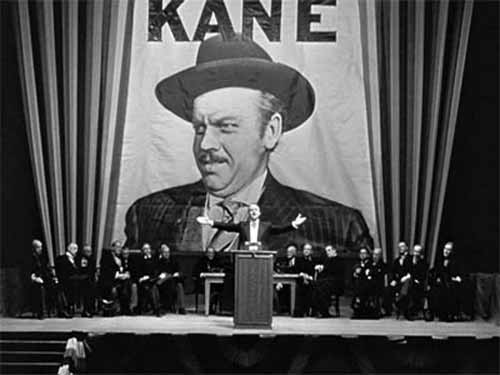 |
| Don't you love megalomania? |
The story centers on the recently deceased Charles Foster Kane, a newspaper magnate who at one point held the power to send himself to the White House. His last word, "Rosebud," baffles everyone. A reporter, Thompson, is sent out to uncover it's meaning and perhaps find a new angle on Kane's life that the other media sources were missing.
He first goes to meet Kane's second wife, a singer in a lowly dive, but she is unable to give the reporter anything. Then, he requests to see the memoirs of Kane's banker and long-time legal guardian, Walter Parks Thatcher. Although they are very informative on a number of things regarding Kane's childhood, Thompson can't discover anything mentioning "Rosebud."
 |
| It's a shame the newspapermen didn't have a window into Kane's thoughts like the audience did. |
At its essence, this is the story of a futile search for a secret. The kind of secret perhaps only one person knows, the individual, the one who takes it to the grave with him. On top of that, it's a tale of perspective. The first of its kind, typical of the visionary work Orson Welles has become identified with (see his War of the Worlds radio broadcast as further proof). This part of what makes the screenplay for Citizen Kane so special. It's focus is definitely not on plot, it's focused on character and idea. Difficult to pull off, but as you can guess, the results are absolutely splendid.
The screenplay was the only thing connected with Citizen Kane that William Randolph Hearst couldn't stop from receiving an Oscar, though I'm sure he tried.
No comments:
Post a Comment